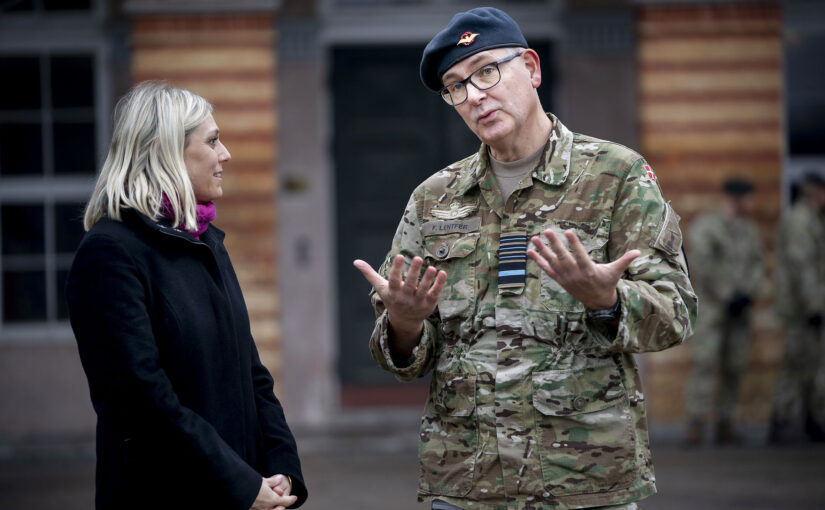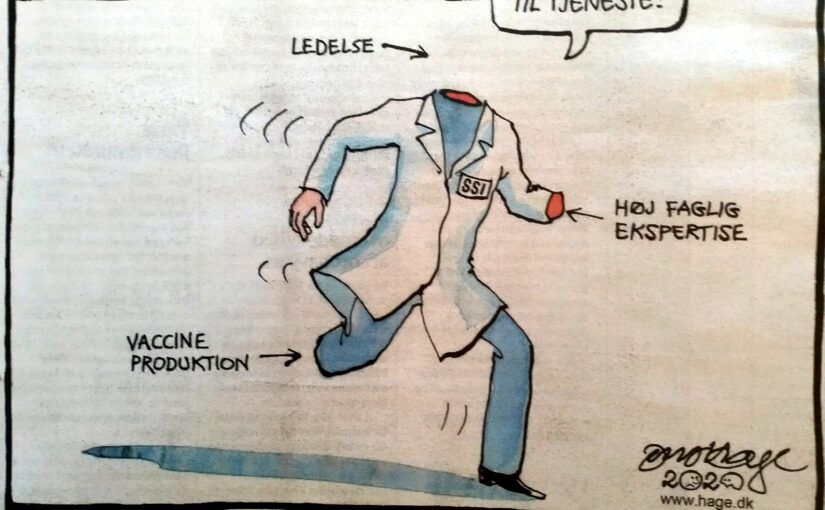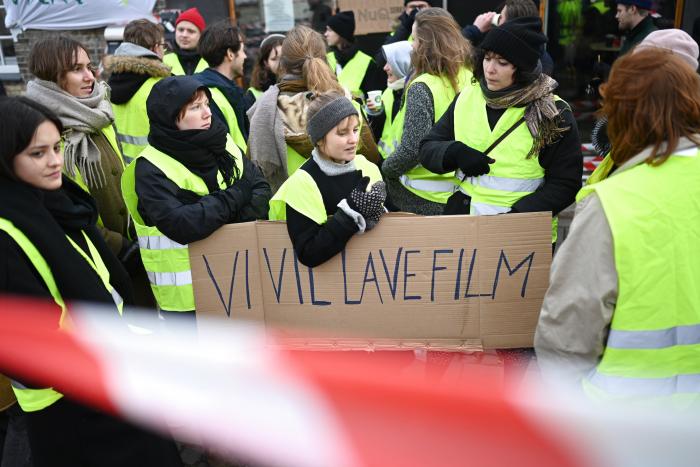Det er nødvendigt at gÃ¥ hele vejen tilbage til 1950. SÃ¥ kan man følge den udvikling, der har medført, at der stadig findes danskere, der mener, at det er af betydning, hvad man kalder den general eller admiral, der har noget loven kalder “kommandoen” over dansk militær.
Det mÃ¥ allerede nu understreges, at ordet “kommando” er groft misvisende i den nuværende situation. Værnenes enheder er kun til rÃ¥dighed for Forsvarschefen i en meget begrænset grad, og hans indflydelse pÃ¥ deres tilstand er bevidst stærkt begrænset.
Forsvarschefens nuværende rolle kan bedst forstås som, at han er projektansvarlig i en tværgående organisation uden klar autoritet over linjeorganisationens dele.
Det hele kritiske problem med den nuværende organisation er, at der ikke er klare sammenhængende myndigheds- og ansvarsforhold. Denne mangel er, som buketten af skandaler viser, en kræftsvulst, der forgifter, korrumperer og ødelægger organisationen og dens mennesker.
Men at få løst dette problem er næppe lettere and at få Myanmars generaler til at opgive magten.
MINISTERIETS LEDENDE (CIVILE) EMBEDSMÆND ER (I BEDSTE FALD) STÆRKT SKEPTISKE OVER FOR MILITÆRFAGLIGE SYNSPUNKTER
Rammen har altid været en både forståelig og nødvendig kritisk dialog mellem på den ene side det politiske mulige og ønskelige, som departementet i Forsvarsministeriet skal støtte ministeren i at repræsentere, og på den anden side det fagligt militære mulige,som Forsvarets og værnenes professionelle ledelse skal repræsentere og søge at skabe forståelse for.
I de første mange år efter 1950 blev dialogen mellem de to synspunkter lettet af de fælles erfaringer i de foregående ti år og af, at et meget stor del af Departementets embedsmænd var militære fagfolk.
De var håndplukkede, ofte højt uddannede, erfarne karriereofficerer, der havde en del af deres tjenesteforløb i ministeriet. De havde en professionel viden og indsigt, som de militære kommandoer, dvs. indtil 1970 værnskommandoerne, kunne finde irriterende, Men denne fagkundskab i departementet lettede også brobygning.
Denne situation er imidlertid ændret igennem de seneste tredive år, hvor stadig flere embedsmænd med rent civil akademisk baggrund ikke ser de fagmilitære erfaringer og argumenter som vægtige i en situation, hvor Danmark ikke trues af storkrig og invasion. De finder synspunkterne uforståelige og ubekvemme, for i modsætning til officerer er de ikke opdraget til at se katastrofale muligheder som beslutnings- og ledelsesrelevante.
FORSVARSCHEFEN SOM KUN ANSVARLIG FOR FORSVARSFORBEREDELSER OG KOMMANDOEN I KRIG
Men nu tilbage til 1950, hvor situationen var anderledes. Politikernes erfaringer gjorde det indlysende, at der var behov for, at de nu tre værn efter etableringen af Flyvevåbnet ikke planlagde og eventuelt gennemførte hver deres forsvarsindsats uden hensyn til de andre.
Den første forsvarschef, admiral Erhard Quistgaard, fik derfor i fredstid underlagt efterretningsvirksomheden samt et koordinerende ansvar for forberedelserne til landets territorialforsvar i krig. Som leder af den danske delegation i planlægningen af NATO havde Quistgaard værdifulde internationale kontakter, som han kunne anvende i stillingen.
Ansvaret for ressourcer og “anlæg”, dvs. byggeri og materielanskaffelser forblev i Forsvarsministeriet, og de tre værns forskellige myndigheder tog sig af materieldrift og uddannelse direkte under ministeriet.
I FORHOLD TIL NU
På overfladen er denne situation meget lig den nuværende, hvor Forsvarschefen kun har det overordnede ansvar for indsættelse af styrkerne, men da opgaven dengang var territorialforsvaret af Danmark mod et truende stormagtskup eller -angreb, var Quistgaards rolle og det politiske behov for hans fagkundskab dramatisk meget stærkere end general Flemming Lentfers.
Nu er situationen fundamentalt anderledes, fordi ingen centrale danske politikere, toneangivende mediefolk eller civile sikkerhedspolitiske eksperter længere synes at acceptere, at der er eller igen kan blive militære roller for dansk forsvar, som er specielt viden- og færdighedskrævende.
Det ignoreres, at uden en solid baggrund mangler personen med sikkerhed grundlaget for at planlægge og lede operationer under krise og konflikter. Det nødvendige fundament er en årelang konstant faglig interesse, støttende formel uddannelse, praktisk ledelseserfaringer fra varierende, realistiske øvelser eller eventuelt tjeneste i internationale myndigheder i krigszoner. Uden denne kan man heller ikke effektivt repræsentere danske interesser i internationalt militærfagligt samarbejde.
ROLLEFORDELINGEN MELLEM MINISTERIET OG VÆRNENE I KRISE
I sidste halvdel 1960’erne brød den daværende ansvarsfordeling mellem Forsvarsministeriet og de tre værnskommandoer sammen. De allieredes vÃ¥benhjælp ophørte, og der var voksende udgifter til stampersonel. Det sidste var et resultat af den stigende modstand mod den først 18 og sÃ¥ 16 mÃ¥neders lange værnepligtstjeneste, som bar styrkernes indsatsberedskabet.
Nu dækkede det forsvarsbudget, som partierne ville stille til rÃ¥dighed, ikke udgifterne. Det fik Forsvarsministeriet til at kaste ansvaret for ressourcerne fra sig, og det landede hos de tre værnskommandoer. Af større poster forblev kun “anlæg” i ministeriet.
Men dette skridt løste ikke problemerne for regeringen. For de tre værnskommandoer fremlagde ønsker om deres fremtidige udvikling, som det var umuligt at holde inden for politisk realistiske forsvarsbudgetrammer. At afveje og prioritere mellem de tre værns ønsker var særdeles ubekvemt for regeringspartier, så allerede, før Forsvarskommissionen af 1969 afgav sin rapport i 1973, besluttede man at give det samlede ansvar til Forsvarschefen.
FORSVARSCHEFEN SOM CHEF FOR FORSVARET I BÃ…DE FRED OG KRIG
Han skulle herefter sammen med en stærkt udvidet Forsvarsstab danne “Forsvarskommandoen”, der afløste de tre værnskommandoer. Opgaverne blev udvidet fra krigsforberedelser og ledelse i krise og storkrig til ogsÃ¥ at drive og udvikle organisationen i fred.
Den daværende Forsvarschef, general Knud Ramberg fra Flyvevåbnet, var imidlertid ikke klar til at overtage økonomiansvaret. Det skete derfor først, da hærchefen, general Otto Blixenkrone-Møller, blev Forsvarschef fra 1972 til 1977.
Dele af de nedlagte tre værnskommandoer blev som små stabe placeret i Forsvarskommandoen. De fik primært doktrin-,uddannelses- og koordinationsansvar.
Forsvarschefens væsentlige underlagte myndigheder var herefter de tre værns operative myndigheder samt deres tre materielkommandoer.
FORSVARSDEPARTEMENTETS GØGEUNGE
Efter nogle år med den nye struktur nåede ministeriets centrale embedsmænd til den opfattelse, at den nu meget stærke Forsvarskommando ikke var tilstrækkelig lydhør over for politiske signaler.
Dette pÃ¥ trods af, at Forsvarsstaben var givet en “Langtidsplanlægningsgruppe”, der skulle udvikle alternativer til den rene fortsættelse af den eksisterende struktur, der blev stadig dyrere. Forfatteren var medlem af gruppen fra 1979 til 1982.
Da Blixenkrone-Møller var blevet afløst af general Knud Jørgensen fra FlyvevÃ¥bnet i 1977, blev den socialdemokratiske minister Orla Møller overbevist af sine embedsmænd om, at man skulle sikre sig kontrol over den politisk “døve” kommando ved at placere sin egen mand i forsvarsledelsen.
Derfor blev oberstløjtnant Gunnar Kjær (“GK”) Kristensen, der var chef for departementets 1. Kontor, udnævnt til generalløjtnant og Chef for Forsvarsstaben. Han skulle pÃ¥ ministeriets vegne fra sin nye stilling kontrollere Forsvarskommandoen under det arbejde med et nyt forsvarsforlig, der samtidig blev iværksat som svar pÃ¥ presset fra NATO for at opnÃ¥ en forøgelse af forsvarsbudgettet.
Fra 1982 blev udviklingen af Forsvaret fanget i den sikkerhedspolitiske konfrontation mellem den borgelige regering og Socialdemokratiet om sikkerhedspolitikken. Under konflikten blev Langtidsplanlægningsgruppen med det nye navn “RÃ¥dgivnings- og analysegruppen” flyttet til Forsvarets Forskningstjeneste. Flytningen skulle give gruppen større frihed til at tænke alternativt.
Den videre udvikling måtte imidlertid afvente det resultat af Forsvarskommissionen af 1988s arbejde, der kom i slutningen af 1989. Forfatteren var menigt medlem af kommissionen.
DEPARTEMENT OG FORSVARSCHEF I SAMARBEJDE
Med først Knud Enggaard og så Hans Hækkerup som Forsvarsminister var general Jørgen Lyng som Forsvarschef fra 1989 til 1996 både ansvarlig for at føre forsvarskommissionens anbefalinger ud i livet. Ved at samle de landmilitære operative kommandoer øst henholdsvis vest for Storebælt i én Hærens Operative Kommando blev det muligt at delegere driften af værnenes aktiviteter og derigennem aflaste Forsvarskommandoen.
Der var gÃ¥et tyve Ã¥r præget af friktion mellem Departement og de fagansvarlige militære kommandoer, før man var nÃ¥et til et fungerende samarbejde. Dette skete imidlertid pÃ¥ det tidspunkt, hvor Forsvarschefens oprindelige opgave – at forberede og eventuelt lede forsvaret af Danmark i krig – blev stadig mindre akut og relevant pÃ¥ grund af Den Kolde Krigs afslutning.
Opgaven fra 1970 havde været at udvikle samt bedst og billigst muligt drive den organisation, der skulle kunne løse netop Den Kolde Krigs opgaver i Danmark og nærområdet i krise og krig. Men hurtigt blev netop den opgave, som var blevet grundigt gennemarbejdet af Forsvarskommissionen af 1988, ikke længere set som relevant.
FORSVARSCHEFEN SOM NEW PUBLIC MANAGEMENT VIRKSOMHEDSLEDER
Da general Christian Hvidt efter få måneder som Chef for Forsvarsstaben blev Forsvarschef ved admiral Hans Gardes død ved flystyrtet på Færøerne i august 1996 var man kommet så langt på afstand af Den Kolde Krig, at man kunne have gennemtænkt og defineret en forsvarschefs faglige rolle under de nu mere klare, ændrede vilkår.
Det skete imidlertid ikke. Hvidt valgte i stedet energisk at omfarme de nye “New Public Management” (NPM)-teorier. Forsvaret skulle organiseres og virke som en veldrevet privat virksomhed, og kun mÃ¥lbare dele af “produktionen” var relevante at sammenholde med forbruget af ressourcer. Det blev som at mÃ¥le Den Kongelige Ballets kvalitet alene pÃ¥ antallet af forestillinger og tilskuere ganget med frekvensen og højden af dansernes spring modregnet danserlønninger og teaterdrift i et regneark. Mange af de forskellige og komplekst samvirkende afgørende faktorer, der skaber effektivitet og synergi i kamp og andre operationer, er ikke mÃ¥lbare.
Det kan ikke undre, at den videregående officersuddannelse, som det havde taget fra 1830 til 1994 at udvikle, nu kom under pres for at nærme sig akademiske civile uddannelser, uanset at dette var værre end spild af penge, fordi det afsporede fagligheden.
Hvidt ignorerede ogsÃ¥ sin rolle som regeringens ansvarlige militærfaglige rÃ¥dgiver, for hans mÃ¥l var at blive set som den administrerede direktør for en gennemrationaliseret, moderne, NPM “New Speak”-talende produktionsvirksomhed.
Det, der gik tabt, var at regeringen ikke længere blev fristet eller opfordret til at udnytte Forsvarschefens faglighed og evne til at forudse udfaldet ved forskellige muligheder. Det skete f.eks., da general Lyng i 1993 overbeviste regeringen om, at det var en risikabel og derfor dårlig idé at følge FNs ønsker og sende den næste nordiske FN-styrke til Srebrenica-enklaven i det østlige Bosnien.
Efter Hvidt var det kun Forsvarschefens opgave at fortælle regeringen hvilke muligheder, man kunne støtte med sin “produktion” af enheder. Han forventedes ikke under fagligt ansvar at forudse, hvad der sandsynligvis ville ske i konflikten og vurdere forskellige handlemuligheder, der derefter kunne drøftes med de allierede.
Hermed satsede man på, at vores større allierede gjorde. Det vil sige, at Hvidt reelt gjorde sin egen militær-faglige position overflødig. Det, han begrænsede sig til, kunne en civilt uddannet embedsmand godt klare.
Stille afgav man selvstændighed i forhold til spørgsmål om krig og fred, noget der aldrig ville ske på EU-relevante områder.
FORSVARSCHEFEN SOM REAKTIV BESTYRER AF VÆRKTØJSKASSEN
Denne begrænsede opgave blev også styrende for Hvidts egen og afløseren, general Jesper Helsøs, indsats ved indsættelsen af danske styrker i Afghanistan, Irak og igen Afghanistan fra sent 2001 til 2006. Det blev ikke set som en dansk opgave selvstændigt at analysere og forudse forløbet af konflikten og tilpasse Forsvarets forberedelser og optræden.
Man gennemtænkte herunder ikke konsekvenserne af, at Danmark var forpligtet af internationale konventioner, og at disse danske forpligtelser ubekvemt afveg fra USAs og selv fra Storbritanniens.
Professionel forudseenhed ville have betydet, at man på forhånd havde forhandlet virkningerne af disse forskelle på plads før udsendelsen. Et pinligt resultat af den manglende rettidige omhu blev dels sagen med efterretningsofficeren Annemette Hommel, dels en lang række sager om den danske rolle under tilbageholdelse og behandling af lokale i missionsområderne. Det var skandaler fremkaldt af svækkelsen af Forsvarschefens ansvar.
Med de ændringer af dansk forsvar, der derefter fulgte Helsøs planlægningsstabs “K-notat” fra 2003, skulle Forsvaret koncentrere “produktionen” om ganske fÃ¥ elementer, der fra “værktøjskassen” med kort varsel kunne tilbydes vores allierede (læs USA) til korttidsbrug. At der hermed var tale om et fravalg af landets muligheder for at løse selvstændige forsvarsopgaver i en meget lang fremtid, bremsede ikke 2005-2009-Forsvarsforliget.
Departementet var blevet skuffet over Langtidsplanlægningsgruppens og RÃ¥dgivnings- og Analysegruppens evne til at producere alternativer til Forsvarskommandoens forslag. I 2005 førte den fortsatte ambition til oprettelsen af et Dansk Institut for Militære Studier. Forfatteren var praktisk projektansvarlig for dets etablering. Instituttet blev indledningsvis fysisk placeret pÃ¥ Forsvarsakademiet men senere flyttet til Københavns Universitet. Instituttets opfattelse af “Militære studier” var imidlertid rent politologisk og produkterne renset for militærfagligt fokus, sÃ¥ departementet fik heller ikke denne gang præsenteret strukturalternativer.
Forsvarets reduktion til “værktøjskasse” undergravede igen grundlaget for den professionelle videregÃ¥ende uddannelse. Den var jo i sin sidste fase udviklet til at kunne gøre eleverne i stand til at overse og planlægge de operationer med styrker fra flere værn, der havde været nødvendige under forsvaret af Enhedskommandoen for Danmark og Slesvig-Holsten (BALTAP). NÃ¥r man kun skulle dække allieredes behov i en kort periode, var selvstændige overvejelser irrelevante.
“FORSVARSCHEFEN” SOM SITUATIONSBESTEMT PROJEKTLEDER
Da dansk forsvars længst varende kampindsats sluttede med tilbagetrækningen fra Helmand-provinsen i Afghanistan, blev alle disse forskellige svækkelser udmøntet i Forsvarsforliget for 2013-2017.
Her bevarede Forsvarschefen ganske vist, hvad man fortsat kaldte “kommandoen” over Hæren, Søværnet og FlyvevÃ¥bnet. Men myndigheden var nu reduceret til at omfatte styrker, der blev taget op fra “værktøjskassen” og klargjort af andre med personel og materiel.
Hvis ministeriet bestemte, at Forsvaret skulle udvikle dele af organisationen, som ved opbygningen af den “brigade”, som er et mÃ¥l i Forsvarsforliget 2018-2023, havde han ikke umiddelbart myndighed til at styre arbejdet. Da næsten hele den “virksomhed” med styring af produktionen, som Christian Hvidt havde set som sin hovedopgave, nu var henlagt til civilt arbejdende styrelser under Departementschefen, er Forsvarschefen henvist til samarbejde med disse styrelser og pÃ¥gældende værn uden mulighed for at bestemme, dvs. “kommandere” og derefter kontrollere, at det sker.
Siden 2013 var ikke længere klare myndigheds- og ansvarsforhold. Det bør ikke undre nogen, at man snart blev ramt af en type af skandaler, der indtil da havde været ukendte i Forsvaret.
Den videregående uddannelse af udvalgte officerer, der muliggjorde militærfaglig analyse af større og komplekse opgaver og kunne støtte bl.a. Forsvarschefen i hans arbejde, blev endelig helt nedlagt i 2014. Samtidig blev den grundlæggende officersuddannelse, der med ændringer og moderniseringer var bevaret igennem mere end 100 år, udhulet ved, at udgangspunktet ikke længere var demonstrerede praktiske lederevner.
Nok sÃ¥ alvorligt er dog, at der i ti Ã¥r pÃ¥ grund af det faldende antal enheder og tjenestesteder ikke har været “praktikpladser” til at sikre, at nyuddannede officerer fÃ¥r praktiske erfaringer. Det er et tidligt resultat af, at Forsvaret ikke længere ledes og udvikles pÃ¥ grundlag af faglig erfaring. Begrebet officer herefter kun af, hvilket gradstegn det i udgangspunkt civile indhold har pÃ¥ uniformen.
Ved det sidste forsvarsforlig er situationen forringet yderligere, ved nedlæggelsen af de specialistskoler, der var ekspertise- og udviklingsansvarlige for nøglekompetenser i de tre værn. Vi blev som Den Kongelige Ballet uden Balletskolen.
Som beskrevet er Forsvarschefs-embedet gradvis blevet udhulet sÃ¥ meget, at han i dag reelt ikke med rette kan benævnes “styrelseschef”, da det er andre, der forvalter hans omrÃ¥des økonomi, materiel og økonomi. Da webmediet OLFI i et interview bragt 16. februar stillede spørgsmÃ¥let: “Hvem er ansvarlig for, at vi ikke lever op til de mÃ¥l, som vi selv har været med til at sætte i Nato?” svarede generalen: »Jeg oplever det ikke som, at der er behov for at placere et ansvar i den her sammenhæng …” Forfatterens erfaring er, at klare myndigheds- og ansvarsforhold fremmer at anvendelsen af ressourcerne rettes mod mÃ¥let, vejledt af chefens faglighed.
Hvorvidt den nye Forsvarschef får magt til at løse de opgaver han får eller stiller sig, afhænger ikke af hans formelle rolle og af, hvad han kaldes. Det afhænger af hans personlighed, energi og argumenter samt den direkte og åbne støtte, som ministeren giver ham i forhold til Forsvarsdepartementets egne styrelser.
FORSVARSCHEFEN HEREFTER?
Lad os til sidst drømme lidt om, hvad der kunne ske nu, hvis de ansvarlige politikere troede aktivt på, at Forsvaret i fremtiden skulle kunne andet end at levere hjælpepoliti.
I det nævnte OLFI-interview gjorde Lentfer klart, at havde ikke havde haft tid til at studere sin profession og krig siden det par Ã¥r i slutningen af 1990’erne, hvor han var lærer pÃ¥ Forsvarsakademiet i værnsfælles operationer. Vi mÃ¥ hÃ¥be, at hans mærmeste hjælpere kan opdatere ham.
Vi er af Donald Trump og samtidig af den grønlandske selvstændighedsbevægelse gjort opmærksom på, at det arktiske område på trods af gode ønsker og hellige besværgelser nok ikke vil forblive et lavspændingsområde og i et uændret Rigsfællesskab, en opgave, som Forsvaret blot skal forvalte.
Der er nu reelt akut behov for en også militærfaglig national analyse af mulige krisesituationer i dette ekstremt krævende operationsområde. Dette også fordi dansk forsvars bidrag uanset ekstre milliarder altid vil forblive ubetydelige i forhold til områdets geografiske udstrækning-
Det er klart, at Rusland stadig ikke fuldt ud accepterer situationen ved landets nordvestgrænse op til Østersøen. Mens svenskerne har forstået og accepteret russernes åbent revisionistiske stormagtsholdning som grundlag for forsvarspolitikken, har danske myndigheder hidtil ikke set det nødvendigt at gøre mere end at bidrage lidt til den symbolske alliancetilstedeværelse i Baltikum uden rigtigt at tage denne opgave alvorligt.
Meget typisk for den civile akademiske ledelse af Forsvaret og “Forsvarets” Efterretningstjeneste herhjemme, har der ikke været fremlagt en militærfaglig analyse af situationen i Baltikum og Østersøen, idet man Ã¥benbart historieløst forudsætter, at NATO-medlemskab i sig selv er afskrækkende i alle situationer. Dette er logisk og historisk erfaringsmæssigt nonsens, fordi det forudsætter, at beslutninger om aggression altid tages pÃ¥ rationelt grundlag.
Nu bindes de to hovedinteresseområder for dansk forsvar direkte sammen af russerne. I deres store militære øvelse i år, Zapad(Vest)-21, er grundlaget for første gang en samtidig konflikt med Vesten i Østersøen og i Arktis.
Det kunne teoretisk set fÃ¥ tænksomme og interesserede politikere til at give Forsvarschefen opgaven at overveje situationen og bidrage til analysen af konsekvenserne. Flemming Lentfer lærte analysemetoden af den daværende oberstløjtnant Lars R. Møller i midten af 1990’erne. Forsvarschefen var Møllers bedste elev.
Man kan sige, at det ville svare til indledningsvis at give Forsvarschefen og hans stab den klare opgave, som admiral Quistgaard fik i 1950. Man skulle så som dengang give ham mulighed for direkte at stille konkrete analyseopgaver til Forsvarets Efterretningstjeneste til støtte for arbejdet.
Det ville også være hensigtsmæssigt igen at uddanne en håndfuld analytisk begavede officerer i strategisk og værnsfælles operativ scenarieanalyse, folk der kunne give generalen en støtte, som ikke kan hentes hos andre faggrupper.
Alternativet er at hente dem i udlandet, fordi vi i Danmark kun gennemfører akademisk pointgivende “Militære studier”.








